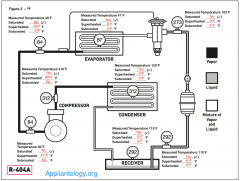FAQs | Repair Videos | Academy | Newsletter | Contact
Search the Community
Showing results for tags 'thermodynamics'.
-

Superheat and Subcooling Exercise Worksheet answers
Samurai Appliance Repair Man posted a gallery image in The Appliantology Gallery
From the album: Refrigerator Repair
This was the homework assignment from the first session of the Refrigerator Sealed System Thermodynamics webinar. You can see that and all the other webinar recordings here: https://appliantology.org/announcement/33-webinar-recordings-index-page/ -

[Webinar - Rescheduled] Sealed System Mastery using Basic Thermodynamics
Son of Samurai posted an event in Tech Training
untilNote: This webinar was rescheduled from its original date on October 30 to November 6. Be sure to subscribe to our newsletter for updates! Who: Professional Appliantologists, Senior Appliantology Fellows, and Legacy Tech members at Appliantology Master Samurai Tech Academy students enrolled in the Refrigerator Repair course Mr. Appliance® Academy students enrolled in Bundle 1 What: Practical Sealed System Thermodynamics In the last session on 10-2-2017, we laid the theoretical groundwork for understanding how sealed systems do what they do: move heat from a refrigerated compartment to the outside world. We looked at basic refrigeration concepts like pressure energy work enthalpy entropy saturation superheat subcooling and we got acquainted with the P-H diagram which we used to understand the ideal refrigeration cycle. We looked at the thermodynamic states of the refrigerant throughout the cycle: compression, condensing, expansion, and evaporation. Then we looked at a real-world refrigeration cycle with temperature and pressure measurements around the system and plotted it on a P-H diagram. We left off with a homework assignment where we're given pressure and temperature measurements around a refrigeration system and we have to determine what state the refrigerant is in: liquid, vapor, mix, saturated, superheated, or subcooled. This is where we'll pick up in this webinar. Having laid some theoretical groundwork in the last webinar, we're going to focus on practical considerations in this one. That means quick n’ dirty techniques for diagnosing sealed system problems using strategically chosen and skillfully interpreted temperature measurements. Here's what we'll be doing: Brief review of the Pressure-Temperature relationship in sealed systems Review homework from the first session on 10-2-2017. Home refrigerator practical design and operating rules-of-thumb useful for troubleshooting Practical application exercises Troubleshooting scenario exercise Techniques for making system temperature measurements for determining superheat and subcooling Sealed system diagnosis homework assignment (to be reviewed in the next webinar in this series) If you attended the first webinar in this series, this is your payday! We’re going to apply that keen, penetrating insight you now possess into money- and time-saving shortcuts you can use to diagnose real-world refrigeration systems on service calls. Also, make sure to do the homework assignment because this will let you test yourself to see whether you understood the key concepts or not. We're going to be proceeding on the assumption that you understand basic concepts like phase change, saturation, superheat, subcooling, etc. If you did not attend the first webinar or haven't watched the two-part webinar recordings of them, you are still welcome to attend, but may be baffled by parts of this one. When: Monday, October 30, 2017, at 7PM Eastern Time SHARP (adjust your time zone accordingly). Where: All of our web meetings are powered by Join.me. For the connection details, see below. Master Samurai Tech Academy Students: RSVP here. Mr. Appliance® Academy Bundle 1 Students: RSVP here. Professional Appliantologists, Senior Appliantology Fellows, and Legacy Techs: fill out the form below to request connection details:<a data-cke-saved-href="https://mastersamuraitech.wufoo.com/forms/mur05y20li0deq/" href="https://mastersamuraitech.wufoo.com/forms/mur05y20li0deq/">Fill out my Wufoo form!</a> How: Here are three tips to ensure that the webinars are a smooth, cool experience for you: Arrive early to make sure your connection is working! Also, if you show up late for the webinar, you'll be lost. Enter your name at the "knock to enter" window on the meeting page- if you leave it blank, you won't be able to enter. Watch this ultra-short video on how to use your Join.me control console.- 2 comments
-
- short cuts
- troubleshooting
- (and 4 more)
-

[Webinar] Basic Refrigeration Sealed System Thermodynamics
Samurai Appliance Repair Man posted an event in Tech Training
untilWho: Professional Appliantologists, Senior Appliantology Fellows, and Legacy Tech members at Appliantology Master Samurai Tech Academy students enrolled in the Refrigerator Repair course Mr. Appliance® Academy students enrolled in Bundle 1 What: Basic Refrigeration System Thermodynamics We're venturing down the rabbit hole- this webinar is the first part in a multi-part webinar series on understanding how the sealed system in a refrigerator works. In this first session, we're going to be laying foundational concepts that will be used in subsequent webinars. So if you miss this one, you'll be lost in the later sessions. In this first part, we're going to discuss and understand: Pressure and vacuum units of measurement Energy and work: BTU vs. BTUH Latent and sensible heats Saturation temperature Boiling point and phase change Enthalpy The Pressure-Enthalpy (P-H) diagram Using the P-H diagram to analyze an ideal refrigeration cycle Refrigerant pressure-temperature saturation tables Superheat and subcooling We'll also look at pressures, superheats, and subcooling at various points around a real-world R134a refrigeration system and plot these on a P-H diagram. You'll need a set of R134a P-T tables or the Danfoss app. When: Monday, October 2, 2017, at 7PM Eastern Time SHARP (adjust your time zone accordingly). Where: All of our web meetings are powered by Join.me. For the connection details, see below. Master Samurai Tech Academy Students: RSVP here. Mr. Appliance® Academy Bundle 1 Students: RSVP here. Professional Appliantologists, Senior Appliantology Fellows, and Legacy Techs: fill out the form below to request connection details:<a data-cke-saved-href="https://mastersamuraitech.wufoo.com/forms/mur05y20li0deq/" href="https://mastersamuraitech.wufoo.com/forms/mur05y20li0deq/">Fill out my Wufoo form!</a> How: Here are three tips to ensure that the webinars are a smooth, cool experience for you: Arrive early to make sure your connection is working! Also, if you show up late for the webinar, you'll be lost. Enter your name at the "knock to enter" window on the meeting page- if you leave it blank, you won't be able to enter. Watch this ultra-short video on how to use your Join.me control console.- 2 comments
-
- subcooling
- refrigeration
- (and 5 more)
-

Tecumseh Guidelines for Utilization of R600A and R290
Samurai Appliance Repair Man posted a file in Appliance Repair Manual Pot Luck Supper
Version 1.0.0
26 downloads
The use of hydrocarbon (HC) refrigerants R600a (isobutane) and R290 (propane) for replacements for HCFC’s and HFC’s continues around the globe. R600a and R290 have ozone depletion potential (ODP) factors of zero (0.0) and a fraction of the global warming potential of those refrigerants they are intended to replace. Both have acceptable toxicity levels; however, both are flammable. Neither of these refrigerants are “drop-in” replacements for HCFC’s or HFC’s. There are significant differences between R600a and R290, and the non-HC refrigerants that must be considered in handling, processing and application. These guidelines are offered to help understand these differences.-
- compressor
- r600a
-
(and 3 more)
Tagged with:
-

New Appliance Service Manual added: Tecumseh Guidelines for Utilization of R600A and R290
Samurai Appliance Repair Man posted a topic in Appliance Service Manual Requests Forum
Tecumseh Guidelines for Utilization of R600A and R290 View File The use of hydrocarbon (HC) refrigerants R600a (isobutane) and R290 (propane) for replacements for HCFC’s and HFC’s continues around the globe. R600a and R290 have ozone depletion potential (ODP) factors of zero (0.0) and a fraction of the global warming potential of those refrigerants they are intended to replace. Both have acceptable toxicity levels; however, both are flammable. Neither of these refrigerants are “drop-in” replacements for HCFC’s or HFC’s. There are significant differences between R600a and R290, and the non-HC refrigerants that must be considered in handling, processing and application. These guidelines are offered to help understand these differences. Submitter Samurai Appliance Repair Man Submitted 09/08/2017 Category Appliance Repair Manual Pot Luck Supper-
- compressor
- r600a
-
(and 3 more)
Tagged with:


